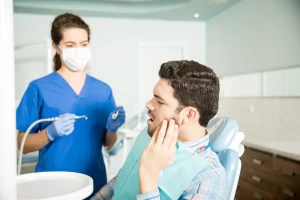Can an Orthodontist Fix My TMJ Pain?

Temporomandibular Joint Disorder (TMJ), often causing nagging jaw pain, clicking sounds when you chew, or even radiating headaches, can significantly impact your quality of life. If you’re experiencing these symptoms, you might be wondering, “Can an orthodontist fix my TMJ?” The answer, while not a simple yes or no, is often encouraging, especially when the root cause of your TMJ issues lies in your bite.
What Exactly is TMJ and How Does My Bite Fit In?
Your temporomandibular joint (TMJ) is a complex hinge connecting your jawbone to your skull. It allows you to chew, talk, and yawn. TMJ disorders encompass a range of conditions affecting this joint, its surrounding muscles, and ligaments. Common symptoms include jaw pain, clicking or popping sounds when opening or closing your mouth, headaches, earaches, and even difficulty chewing.
While several factors can contribute to TMJ, including stress, arthritis, or injury, a misaligned bite (malocclusion) is often a significant culprit. Think of your teeth as puzzle pieces; they should fit together comfortably. When your teeth don’t align properly – for example, with an overbite (upper teeth protruding too far), underbite (lower teeth protruding), crossbite (upper and lower teeth don’t meet correctly), or open bite (a gap between upper and lower front teeth) – it places extra stress on your TMJ. This constant strain can lead to inflammation, pain, and other TMJ symptoms.
Imagine a misaligned door hinge. Forcing it open and closed repeatedly will eventually cause it to become damaged and painful. Similarly, a misaligned bite forces your jaw to work harder, potentially leading to TMJ problems.
How an Orthodontist Can Help Relieve TMJ Pain Related to Bite Issues
Orthodontists are specialists in diagnosing and treating bite problems. They can assess whether your bite is contributing to your TMJ symptoms. While they may not be able to “cure” TMJ in every case (as other factors might be involved), they can certainly address bite-related issues that exacerbate the condition.
A thorough examination is crucial. Your orthodontist will likely use X-rays, dental models, and a clinical examination to assess your bite, jaw alignment, and the condition of your TMJ. They’ll also discuss your symptoms and medical history to get a complete picture.
If your orthodontist determines that your bite is a contributing factor, they may recommend several treatment options:
- Braces for TMJ-Related Bite Correction: Traditional braces can gradually shift your teeth into a more optimal position, correcting misalignment and improving jaw function. This can significantly reduce the strain on your TMJ and alleviate pain.
- Invisalign for Addressing Bite Misalignment and TMJ: Invisalign, using clear aligners, offers a more discreet way to straighten your teeth and correct bite problems. Similar to braces, Invisalign can help improve jaw alignment and reduce TMJ symptoms related to malocclusion.
- Retainers for Maintaining Corrected Bite and TMJ Health: After orthodontic treatment, retainers are essential for maintaining your new bite alignment. This ensures that the improvements to your jaw function and TMJ health are sustained long-term.
- Splints and Night Guards for TMJ Pain Relief: In some cases, your orthodontist might recommend a splint or night guard to help reposition your jaw and alleviate pressure on the TMJ. These appliances are often used in conjunction with other orthodontic treatments.

When Should I See an Orthodontist for TMJ vs. Other Specialists?
If your TMJ symptoms are primarily related to your bite, an orthodontist is the ideal specialist to consult. They are uniquely qualified to diagnose and treat bite problems that contribute to TMJ.
However, it’s essential to recognise that TMJ can have multiple causes. If your symptoms are not primarily related to your bite, other specialists might be involved, such as:
- Dentists: Your general dentist can often provide an initial assessment of your TMJ and refer you to the appropriate specialist.
- Oral and Maxillofacial Surgeons: In more complex cases, such as structural jaw abnormalities, surgery might be necessary.
- Physical Therapists: Physical therapy can help improve jaw mobility, reduce muscle tension, and alleviate pain.
- Pain Management Specialists: For chronic TMJ pain, a pain management specialist can help develop a comprehensive treatment plan.
A multidisciplinary approach, involving several specialists, is sometimes necessary for effective TMJ management.
What are the Benefits and Limitations of Orthodontic Treatment for TMJ?
When bite problems are a contributing factor to TMJ, orthodontic treatment can offer significant benefits:
- Reduced Pain: Correcting your bite can alleviate pressure on the TMJ, leading to a reduction in jaw pain, headaches, and other associated symptoms.
- Improved Jaw Function: A properly aligned bite allows your jaw to function more smoothly and efficiently, making chewing and speaking more comfortable.
- Better Bite: Orthodontic treatment improves the overall alignment of your teeth, creating a more harmonious and functional bite.
However, it’s important to have realistic expectations. Orthodontic treatment for TMJ has limitations:
- Not a Cure-All: Orthodontics addresses bite-related TMJ issues, but it might not be effective for all cases, particularly those where other factors are the primary cause.
- Time Commitment: Orthodontic treatment takes time, typically several months to a few years. It’s not a quick fix for TMJ pain.
- Potential Discomfort: Some discomfort is normal during orthodontic treatment, but it is usually manageable.
Finding an Orthodontist Experienced in Treating TMJ-Related Bite Issues
Choosing the right orthodontist is crucial for successful TMJ treatment. Look for an orthodontist with:
- Advanced Training and Experience: Seek an orthodontist who has specific training and experience in treating TMJ disorders related to bite problems.
- Comprehensive Approach: Your orthodontist should thoroughly evaluate the root cause of your TMJ symptoms and develop a personalised treatment plan.
- Open Communication: Choose an orthodontist who listens to your concerns, explains treatment options clearly, and answers your questions patiently.

Addressing Your Concerns About Orthodontic Treatment for TMJ
Many people have questions and concerns about orthodontic treatment for TMJ. Here are some common ones:
- Is it painful? While some discomfort is normal, most people find orthodontic treatment manageable. Your orthodontist can recommend strategies to minimise any discomfort.
- How long does it take? Treatment time varies depending on the complexity of your case, but it typically ranges from several months to a few years.
- What is the cost? The cost of treatment varies. Discuss payment options and insurance coverage with your orthodontist.
- Are there risks? As with any medical procedure, there are potential risks associated with orthodontic treatment. Your orthodontist will discuss these with you.
Taking the First Step Towards TMJ Pain Relief
If you suspect your bite might contribute to your TMJ pain, consulting an orthodontist is a crucial first step. They can assess your bite, determine if orthodontic treatment is appropriate, and help you develop a plan to achieve a healthier, pain-free jaw. Don’t let TMJ pain control your life – seek professional help from Dr Bobby today and take the first step towards a more comfortable future. Contact us now.
